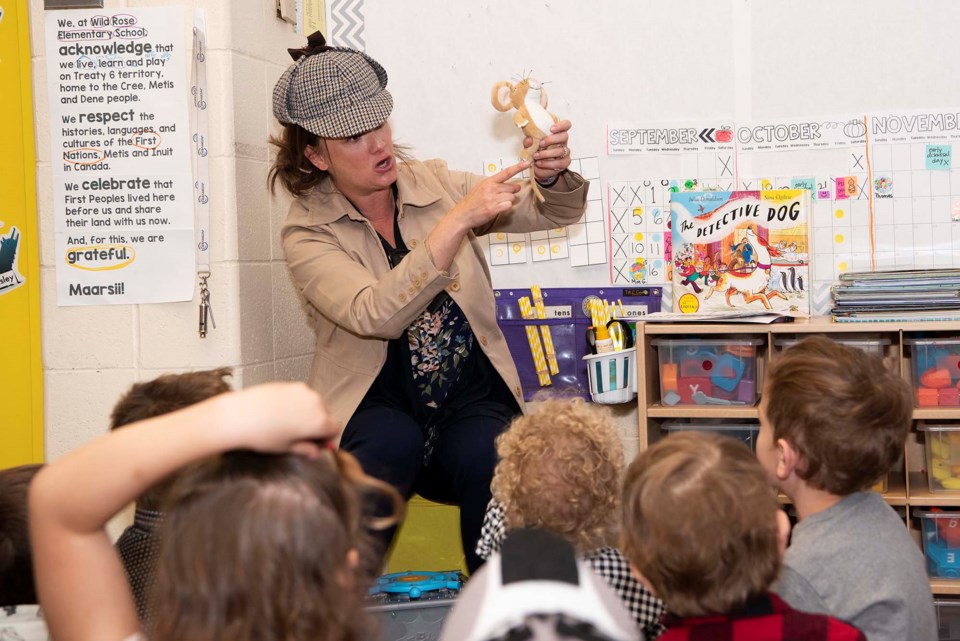Wild Rose students put on their detective hats this month to test-drive Alberta’s new science curriculum.
Thousands of Alberta K-6 students and teachers came back to school this fall under the province’s new curricula for K-3 English language arts, K-3 math, and K-6 physical education and wellness.
About 1,000 teachers were also test-piloting the province’s new K-6 curricula in science, French first language and literature, and French immersion language arts and literature, Alberta Education spokesperson Katherine Stavropoulos said in an email.
Amy Bautista was one such teacher. She was test-driving the science curriculum with her Kindergarten class at Wild Rose Elementary in St. Albert.
“The great thing about curriculum is it tells you what to teach but it doesn’t tell you how,” she said.
To teach her students about the five senses as part of the science curriculum, Bautista transformed her classroom into a detective agency earlier this month. Students donned deerstalker hats and peered through magnifying glasses as they deciphered clues related to descriptive sensations.
Pilot check-up
The Gazette spoke with Bautista and other Alberta teachers for a one-month review of the new curricula.
Leo Nickerson vice-principal Adam Rurka said he appreciated the English curriculum’s new focus on phonics (how letter combinations sound), as research showed this to be a better way to teach literacy than the old “whole language” approach (where you have a child read many books and hope they figure out how English works). Rurka said some teachers have said they were performing “educational triage” just to fit the new material in, though, and cutting back on other important topics — a consequence of too much change all at once.
“We can’t wait decades before updating our curriculum,” Rurka said (the old English curriculum dates back to 2000), and more frequent updates would make these shifts more manageable.
Alberta teachers have struggled to find up-to-date resources with which to teach the new curricula, especially with French courses, said Alberta Teachers’ Association Jason Schilling. Others were frustrated the province didn’t try to bridge knowledge gaps between the old and new curricula. This fall’s literacy assessment tests asked Grade 3 students about numbers in the 10,000s, for example, but most only knew how to count to 100, which was what was required of them under the old curriculum. Grade 1 students were likewise expected to be familiar with phonetics — knowledge they wouldn’t have if they skipped Kindergarten (which is optional).
“It’s asking them questions they never learned in school,” Schilling said.
Rurka said the new science curriculum was definitely needed, as the old one was written in the 1990s. The new one just as packed with material as the old one, but put much more emphasis on inquiry and exploration, and had unifying thematic questions to pull different units together.
Bautista said the draft science curriculum shifted a lot of concepts back to Kindergarten from Grade 1, and was much more prescriptive in its requirements. For example, while the old curriculum might ask students to explore objects in various ways, the new one specifically asked students to do so with the five senses and to describe how they contribute to observations. She had yet to spot any standout problems or positives with the new curriculum, and wanted to see how much additional work teachers would have to put into it to make it functional.
Alberta Education was collecting comments on its science, French language and literature, and French immersion language arts pilots this fall. Those subjects were to be revised next spring and rolled out province-wide next fall.
Schilling called on the province to do a more thorough pilot of these subjects and to ensure teachers had the time and money needed to implement them.
“We want to make sure we get this right so we don’t fail a generation of students.”
Visit alberta.ca/curriculum-have-your-say.aspx to comment on the new curriculum.




